Worm Castings Versus...
Worm Castings vs. Bat Guano
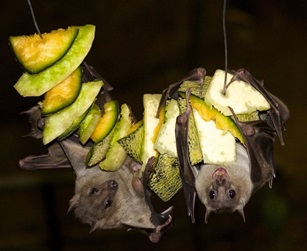 Gardeners and farmers know the importance of properly balanced nutrients in the soil. Bat guano is an excellent source of nitrogen, phosphorus and potassium, all very important for your plants to thrive. Guano is also a good soil conditioner, both enriching the soil and improving drainage and texture, much like worm castings. Select marijuana growers use bat guano to develop their plants, although having it shipped in from a different continent is no easy task.
Gardeners and farmers know the importance of properly balanced nutrients in the soil. Bat guano is an excellent source of nitrogen, phosphorus and potassium, all very important for your plants to thrive. Guano is also a good soil conditioner, both enriching the soil and improving drainage and texture, much like worm castings. Select marijuana growers use bat guano to develop their plants, although having it shipped in from a different continent is no easy task.
Similar to worm castings, bat guano can be used as a top dressing to the soil, or made into a tea to be sprayed onto the plant directly. Unlike worm castings, you should pay attention to the nutrient balance in the guano you purchase as they differ depending on the type of guano you use, and guano should be applied in smaller amounts, as too much could harm your plants by oversaturating them with nitrogen.
It is important to note that guano should only be obtained from fruit and insect feeding species, but luckily, that is most of the bat population. Of over 1,000 different species of bats, less than ten feed on animal blood and those species are largely found in Latin America.
The downside of bat guano is that it is expensive, often costing four times as much as worm castings, even before shipping costs. Unless you live in Jamaica, Sumatra or Indonesia, it may be difficult to obtain local bat guano that is the most desirable for plants. Bats live everywhere, of course, but certain species generate better fertilizer, and those species tend to prefer tropical cave-dwelling.
Worm Castings vs. Compost
There is no doubt that composting is a beneficial and responsible way to use up food scraps in your home. Vegetable scraps, coffee grounds, fruit peels and cores can all be added to a (preferably neatly contained) pile in your backyard that will eventually be mixed and turned with dead leaves, grass clippings, and other yard scraps to become gloriously rich and nutritious “black gold”. Composting is an essential way to restore vitality to depleted soil and recycle your organic waste.
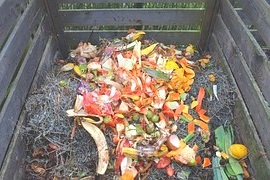 Like most things, your compost pile is a tiny ecosystem. You should not introduce any diseased plants, molds, or anything chemically treated. These unwanted contaminants will not magically go away, but could rather infect your entire compost pile and then anything that compost comes in contact with.
Like most things, your compost pile is a tiny ecosystem. You should not introduce any diseased plants, molds, or anything chemically treated. These unwanted contaminants will not magically go away, but could rather infect your entire compost pile and then anything that compost comes in contact with.
You should also chop up any large pieces you would add to the pile to facilitate faster breakdown. Any veteran composter will know that adding those avocado skins and pit to the pile won’t harm it, but you will be seeing them for a long, long time. Furthermore, you should never add meat, fish, fat, citrus peels, dairy, bread, rice, feces (human & animal), sanitary products, treated paper or sawdust to your compost bin.
The ideal compost pile is a balanced mix of nitrogen and carbon. This is by no means definitive, but a rule of thumb is that food scraps tend to yield nitrogen and yard scraps tend to yield carbon. Combine in a handy composting container, which can be made of wood, plastic, or anything similarly durable. Metal containers are not ideal as they will corrode over time.
Inside the bin, your compost will begin to heat up and break down. This heat is caused by microbial metabolism and is dependent on the size of the compost pile, the carbon to nitrogen ratio of the materials, the moisture content and the aeration of the contents.
Composting is somewhat labor intensive, what with turning and monitoring the materials, but it is worth it to keep your food scraps out of landfills and help out your soil. As the compost heats up, however, that heat can kill off many beneficial microbes necessary for optimum plant heath and considerable nitrogen loss. Therefore, you should compost and nourish your soil every year and supplement that practice with local, microbe-rich worm castings.
See the recommended ratio of worm castings/compost mix.
Worm Castings vs. Chemical Fertilizers
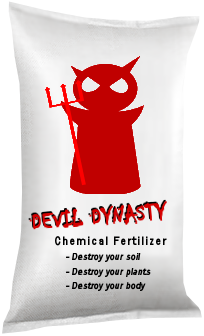 Soil is a living organism and should be treated as such. Chemical fertilizers “kill” the soil while organic fertilizers improve and sustain the soil.
Soil is a living organism and should be treated as such. Chemical fertilizers “kill” the soil while organic fertilizers improve and sustain the soil.
Chemical fertilizers contain acids, including sulfuric and hydrochloric acids. Think about what loose, dry soil looks like in your hand when you scoop up a handful. It should have a crumb-like texture if you are able to scoop it up. Chemical fertilizers break up the particles that form these crumbs, destroying the soil structure. The result is a compacted surface that prevents water from penetrating the earth’s crust, causing even more problems for your plants that then need more solutions, literally.
Chemical fertilizers also affect the soil’s pH and kills the beneficial microbes living in the soil that are necessary to fortify plants with natural immunity to disease and destruction, including ants and earthworms, the best soil aerators.
Furthermore, chemical fertilizers are dangerous for the environment. Pesticides, herbicides and fertilizers are responsible for poisoning water, aquatic life, plant life, birds and mammals, including your pets.
Local, organic, microbe-rich worm castings have been tested and shown to yield 126% bigger, stronger plants when compared with traditional fertilizers. Use the earth’s organic fertilizer; treat your plants with worm castings instead of Dr. Frankenplant’s chemical compounds.
TIP: Try mixing worm castings with fertilizer.
Worm Castings vs. Manure
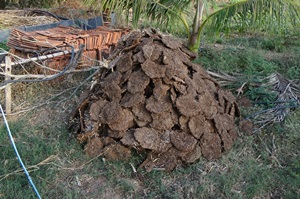 Animal manure is a prime source of nitrogen, potassium and phosphorus. It is also rich in bacteria, and not just the good kind. Fresh manure should not be used on your edible garden or plants because first of all, it will probably burn and dehydrate your plants and second, the risk of exposure to nasty pathogens like E.coli and salmonella are likely.
Animal manure is a prime source of nitrogen, potassium and phosphorus. It is also rich in bacteria, and not just the good kind. Fresh manure should not be used on your edible garden or plants because first of all, it will probably burn and dehydrate your plants and second, the risk of exposure to nasty pathogens like E.coli and salmonella are likely.
When you see (or smell) farmers spreading manure, they are usually doing it in the fall to condition the soil over the winter, or to replenish nutrients in a field well before planting an edible crop.
Manure must be aged before use. Fresh manure has high acid levels that can burn plants. Aging it allows these acids to dissipate, and reduces the risk of pathogen exposure. That said, always prevent contamination when using manure as fertilizer by using gloves, and cleaning hands, tools and produce thoroughly.
Manure is aged by letting the manure sit out in the sun in a safe place (away from water runoff, pets and human interaction). You can pair it with carbon-rich materials like straw, shredded paper and leaves. Heat from the sun and the inherently-high nitrogen levels will “toast” the poop. Let it roast for at least six months until it is no longer stinky and all moisture has evaporated.
*NEVER* use the manure from a meat eater, i.e. humans, cats, dogs, lions, etc.
OR you could fertilize your lawns with non-toxic, organic, microbe-and-good-bacteria-rich, worm castings. Worm castings, also known as vermicompost, are inexpensive, NPK balanced, odor-free, ready-to-use and superb for your plants, no E.coli risk necessary.
Worm Castings vs. Chicken Manure
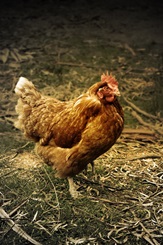
Chicken manure is an excellent full-circle fertilizer for people that keep chickens at home. The average hen can make one cubic foot of manure every 6 months. Like other manures, you have to age it. Corral it with chicken wire and combine it with carbon-based matter like fallen leaves or dry grass clippings. If left unattended, it will be ready to use in 6-12 months. If turned occasionally, the manure can be ready in 4-6 months.
Chicken manure has high nitrogen levels, which can be overwhelming for a lot of plants, but is great if you have soiling lacking in nitrogen. Corn crops eat up nitrogen, so chicken manure is great if you are cultivating corn.
If you don’t keep chickens and need to use up all the poop they produce, or you need an organic fertilizer while your manure ages, you can fertilize your plants and garden with worm castings. You don’t have to be concerned about toxicity, and worm castings are rich with beneficial microbes and bacteria. Worm castings are also already perfectly balanced with nutrients so you don’t have to worry about burning your plants or over-fertilizing.

